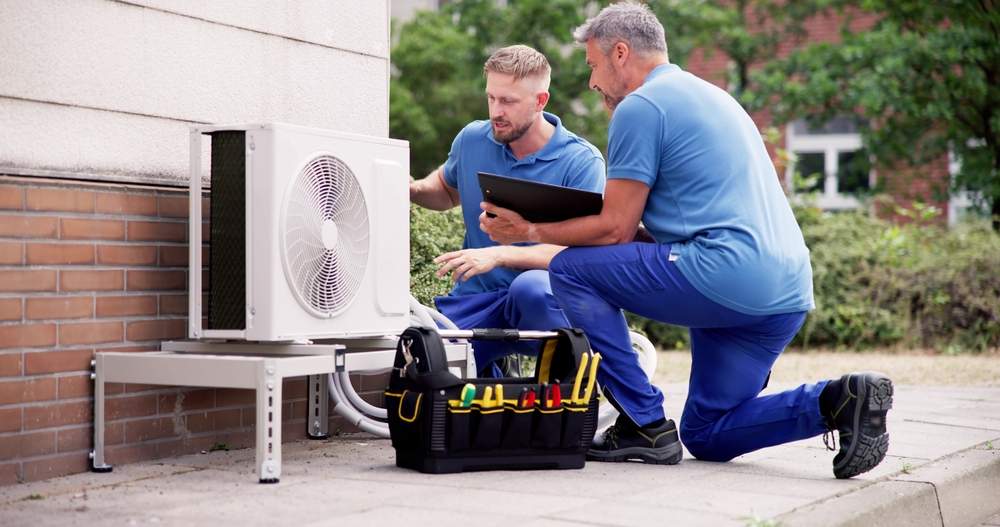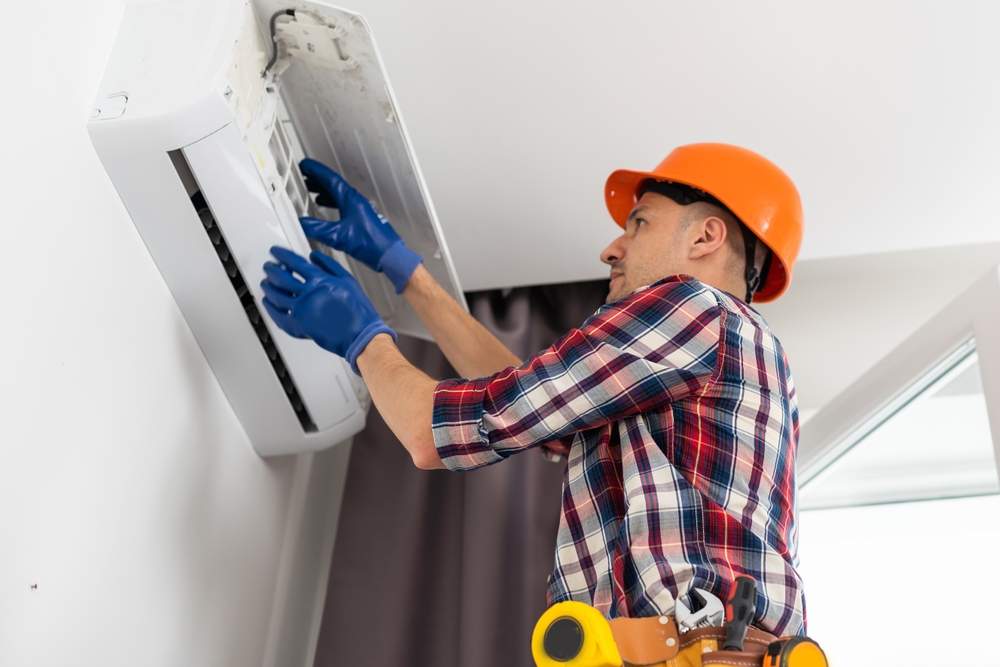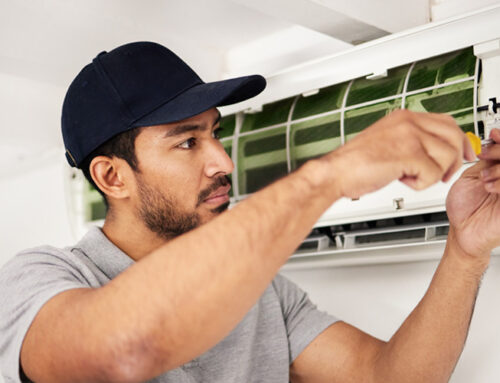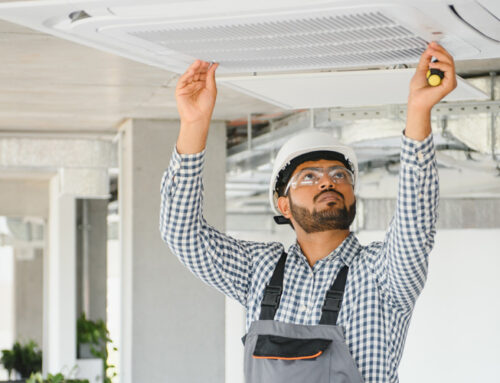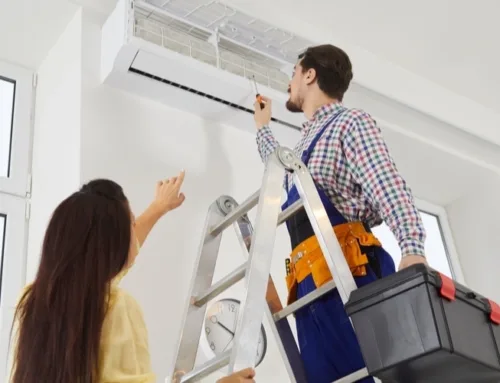Ensuring your commercial AC runs smoothly is not just about comfort—it’s about maintaining a productive work environment and preventing costly downtime that can disrupt your business. With the right approach to AC maintenance, you can keep your system in top shape and avoid unexpected breakdowns. This guide is your trusted advisor, offering practical tips like routine air filters changes, ductwork checks, and refrigerant levels monitoring.
By embracing these strategies, you’ll empower yourself to tackle the common challenges of commercial AC troubleshooting, ensuring a comfortable atmosphere for both employees and customers. Dive with us at Chills AC into the actionable steps that will keep your AC running efficiently and your business thriving
The Importance of AC Maintenance
Benefits of Regular Servicing
Regular servicing of your commercial AC unit brings numerous benefits that go beyond just cooling efficiency. First and foremost, it helps in prolonging the lifespan of your equipment. By identifying and addressing minor issues early, you prevent them from escalating into major, costly repairs. Moreover, regular maintenance ensures optimal energy efficiency, which can significantly reduce your utility costs. An efficiently running system demands less energy, translating into savings on your energy bills.
Also, consistent servicing improves indoor air quality by ensuring that components like air filters are clean, which is crucial for the health and comfort of everyone in the building. Finally, regular checks on ductwork and refrigerant levels ensure the system operates smoothly, minimizing the risk of sudden breakdowns. By investing in regular professional servicing, you’re investing in your business’s efficiency and the comfort of your workplace
Impact on Business Efficiency
The efficiency of your business is directly linked to the performance of your commercial AC system. When your AC is in top condition, it maintains a comfortable environment that boosts employee productivity. Conversely, a malfunctioning unit can lead to an uncomfortable atmosphere, resulting in decreased motivation and increased downtime. Moreover, unexpected breakdowns can disrupt operations, affecting both your workforce and customer experience.
Regular AC maintenance, including routine air filters changes and ductwork checks, is crucial for ensuring reliable performance. This proactive approach minimizes interruptions, allowing your team to focus on core business activities. Additionally, efficient AC systems help control operational costs by reducing energy consumption, freeing up resources for other essential areas.
By prioritizing regular maintenance, you ensure that your commercial AC system supports rather than hinders your business efficiency, fostering a more productive and reliable work environment
Avoiding Costly Repairs
Regular AC maintenance is a strategic move to avoid costly repairs. By routinely checking components such as refrigerant levels and air filters, potential issues can be identified and resolved before they escalate into major problems. For instance, a simple air filter change can prevent the system from overworking, which often leads to component failure.
Additionally, a routine ductwork check can uncover leaks that might otherwise lead to inefficiencies and strain on the system. These preventive measures are far more economical compared to the expenses incurred from emergency repairs or complete system overhauls.
Furthermore, maintaining your AC system prolongs its lifecycle, delaying the need for a costly replacement. By investing in regular maintenance, you not only secure the comfort of your work environment but also protect your budget from unexpected repair bills, ensuring that your resources are better allocated towards growth-oriented activities
Essential Routine Inspections
Checking Air Filters
Checking and changing air filters is a fundamental aspect of AC maintenance that should never be overlooked. Air filters play a vital role in trapping dust, pollen, and other airborne particles, ensuring that the air circulating within your commercial space is clean and healthy. Over time, these filters can become clogged, reducing airflow and forcing your AC system to work harder than necessary.
This not only decreases efficiency but also increases energy consumption and costs. Regular inspection and replacement of air filters, typically every 1-3 months depending on usage and environmental factors, can prevent these issues. A clean filter not only promotes better air quality but also extends the life of your AC unit by reducing strain on its components.
By making air filter checks a routine part of your maintenance schedule, you’re taking a simple yet effective step towards ensuring the reliability and efficiency of your commercial AC system
Ductwork Examination
Regular ductwork examination is crucial for maintaining the efficiency of your commercial AC system. Ducts are responsible for distributing cooled air throughout your building, and any issues within them can lead to significant energy losses. Over time, ducts can develop leaks, become blocked, or accumulate dust and debris, all of which impede airflow and reduce system efficiency. To address these issues, it’s essential to perform periodic ductwork inspections.
During these checks, look for visible signs of wear, such as holes or tears, and ensure that all connections are secure. Additionally, cleaning the ductwork can help maintain optimal airflow and improve indoor air quality. Addressing these potential problems early on can prevent more serious issues down the line, such as heightened energy bills or uneven cooling.
By prioritizing ductwork examination as part of your routine maintenance, you help ensure that your AC system operates at peak performance, providing consistent comfort throughout your commercial space
Refrigerant Levels Monitoring
Monitoring refrigerant levels is a critical component of routine AC inspections. The refrigerant is essential for the cooling process, absorbing heat from the indoor air and releasing it outside. If refrigerant levels are too low, the system can’t effectively cool the space, leading to increased energy consumption and reduced efficiency.
Low refrigerant levels may also indicate leaks, which require immediate attention to prevent further system damage. Regular monitoring involves checking the pressure levels of the refrigerant to ensure they align with the manufacturer’s specifications. If discrepancies are found, it’s vital to consult a professional to address the issue promptly. Ignoring refrigerant problems can lead to compressor failure, one of the most expensive repairs in an AC system.
By maintaining proper refrigerant levels, you ensure that your commercial AC system operates efficiently, providing optimal comfort while safeguarding against costly repairs and extending the lifespan of your equipment
Common AC Troubleshooting Tips
Identifying Common Issues
Identifying common issues is the first step in effective AC troubleshooting. Some problems are easy to spot, such as insufficient cooling, unusual noises, or unexpected increases in energy bills. These symptoms often indicate underlying issues like clogged air filters, refrigerant leaks, or malfunctioning components. For instance, if the AC is blowing warm air, it might be due to a refrigerant leak or a failed compressor.
Unusual noises could signal problems with the fan or motor bearings. Another common issue is uneven cooling, which often stems from blocked vents or ductwork issues. Addressing these problems promptly can prevent further damage and maintain the efficiency of your system. While some issues can be resolved with simple maintenance tasks, like changing air filters, others may require professional intervention.
Being aware of these common problems allows you to respond quickly, minimizing downtime and ensuring your commercial AC system continues to operate efficiently
Quick Fixes for Minor Problems
Sometimes, minor AC issues can be resolved with simple, quick fixes, sparing you from more complicated troubleshooting. If your AC isn’t turning on, first check the thermostat settings to ensure it’s set to the correct mode and temperature. Also, inspect the circuit breaker to confirm it hasn’t tripped. For inadequate cooling, verify that the air filters are clean, as dirty filters can significantly impact performance.
Cleaning or replacing them can often restore proper airflow. If you notice uneven cooling, check that all vents are open and unobstructed. This small adjustment can balance airflow and improve comfort levels. When dealing with strange noises, tightening loose screws or bolts might be all that’s needed to eliminate the sound. While these quick fixes can solve many minor issues, persistent problems may require professional attention to ensure there aren’t underlying concerns that could lead to more significant repairs later
When to Call a Professional
Knowing when to call a professional is crucial in AC troubleshooting. While some minor issues can be addressed with simple DIY fixes, certain problems require expert intervention. If your AC unit is leaking refrigerant, it’s essential to contact a professional immediately, as handling refrigerants requires specialized knowledge and equipment. Persistent electrical issues, such as frequent tripping of the circuit breaker, also warrant professional attention to avoid potential safety hazards.
Additionally, if your system emits unusual odors or makes loud, unfamiliar noises, it could indicate serious mechanical problems that need expert diagnosis. Professionals can also identify and rectify airflow issues or uneven cooling that might stem from complex ductwork problems. Regular maintenance visits from a professional can prevent many of these issues from occurring in the first place. By recognizing the signs that necessitate professional help, you ensure that your commercial AC system receives the care it needs to operate safely and efficiently
Professional Servicing Benefits
Extending AC Lifespan
Professional servicing is key to extending the lifespan of your commercial AC system. Regular, expert maintenance ensures that each component of the system functions optimally, reducing wear and tear over time. Technicians can identify and address minor issues before they escalate into significant problems, thereby preventing costly repairs and premature system failure. This proactive approach not only helps maintain efficiency but also prolongs the unit’s operational life.
By keeping components like compressors, fans, and coils clean and in good condition, you minimize the stress on the system, which can lead to longer service life. Moreover, professional servicing includes comprehensive checks that ensure refrigerant levels are correct and all electrical connections are secure, further safeguarding the unit’s longevity. Investing in regular professional servicing is a strategic decision that maximizes the return on your AC system investment, ensuring reliable performance and comfort for years to come
Ensuring Optimal Performance
Professional servicing is essential for ensuring the optimal performance of your commercial AC system. Regular maintenance by trained technicians helps maintain the system’s efficiency, ensuring it operates at peak performance. Professionals carry out detailed checks and adjustments, such as calibrating the thermostat, tightening electrical connections, and cleaning essential components like coils and fans.
These actions enhance the system’s ability to cool effectively, improving air quality and comfort within your facility. Furthermore, expert technicians can optimize the refrigerant charge and inspect the ductwork for obstructions, ensuring smooth airflow throughout the building. By addressing these critical areas, professional servicing not only enhances the unit’s efficiency but also reduces energy consumption, leading to cost savings on utility bills. Ultimately, consistent professional attention helps maintain a reliable system that supports a comfortable and productive environment, allowing you to focus on running your business without the worry of unexpected AC failures
Scheduling Regular Check-Ups
Scheduling regular check-ups for your commercial AC unit is a proactive step toward maintaining its efficiency and longevity. These routine inspections allow professionals to catch potential issues before they develop into costly problems. Regular check-ups typically include a thorough examination of the system’s components, ensuring everything from the thermostat to the ductwork is operating correctly. By establishing a maintenance schedule, you ensure that tasks like air filter replacement, refrigerant level monitoring, and system cleaning are consistently performed. This consistency not only optimizes performance but also reduces the likelihood of unexpected breakdowns, which can disrupt business operations.
Furthermore, routine check-ups help maintain energy efficiency, translating into lower operational costs over time. By committing to a regular maintenance schedule, you invest in the reliability and durability of your AC system, ensuring a comfortable environment for both employees and customers throughout the year
Strategies to Minimize Downtime
Implementing Preventive Measures
Implementing preventive measures is crucial for minimizing downtime in your commercial AC system. Proactively addressing potential issues helps maintain consistent performance and avoid unexpected disruptions. One key measure is establishing a routine maintenance schedule, which includes tasks like regular air filter changes and ductwork inspections. These actions prevent common problems such as airflow blockages and system strain.
Additionally, monitoring refrigerant levels can avert cooling inefficiencies and costly repairs due to leaks. It’s also beneficial to educate staff on basic troubleshooting techniques, enabling them to identify and address minor issues before they escalate. Another preventive strategy is investing in a programmable thermostat, which optimizes temperature settings and reduces unnecessary wear on the system.
By implementing these measures, you not only enhance the reliability of your AC unit but also extend its operational lifespan, ensuring a comfortable and efficient working environment that supports continuous business operations
Efficient System Upgrades
Efficient system upgrades are a strategic way to minimize downtime and enhance the performance of your commercial AC unit. As technology advances, upgrading components such as thermostats, compressors, or even the entire system can lead to significant improvements in efficiency and reliability. Modern AC units are designed to operate more efficiently, consuming less energy while providing superior cooling. By investing in newer, more efficient models, you can reduce operational costs and decrease the likelihood of unexpected breakdowns.
Upgraded systems often come with advanced features like smart thermostats, which allow for precise temperature control and scheduling, further optimizing energy use. Additionally, newer systems typically offer enhanced durability and come with extended warranties, providing peace of mind and reducing maintenance concerns. Considering the long-term benefits, efficient system upgrades are a valuable investment that ensures your AC system supports a comfortable and uninterrupted work environment, aligning with your business’s operational goals
Employee and Customer Comfort
Maintaining employee and customer comfort is a central objective when minimizing downtime in your commercial AC system. A well-functioning AC unit ensures a pleasant indoor environment, which is crucial for productivity and customer satisfaction. Employees working in a comfortable setting are more focused and efficient, reducing errors and increasing overall output. Similarly, customers are more likely to enjoy their experience and return when their environment is comfortable, directly impacting your business’s bottom line
To achieve this, regular maintenance and timely upgrades are essential, preventing disruptions that could lead to discomfort. Implementing smart environmental controls, such as programmable thermostats, can optimize energy use while maintaining consistent temperatures, enhancing comfort.
Ultimately, prioritizing the operational reliability of your AC system not only minimizes downtime but also fosters a positive atmosphere for both employees and customers, reinforcing your business’s reputation and ensuring smooth, uninterrupted operations. For all other question, call us today

